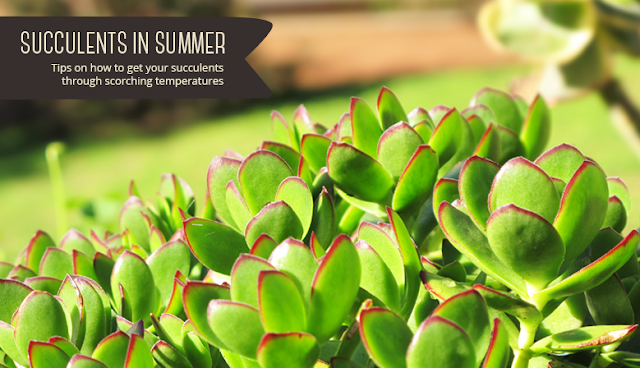As we delve deeper into the Summer months, scorching temperatures are yet again rearing their ugly heads. Perth is renowned for its intensely hot sun, and our recent maximums of high 30's are only a sign of things to come.
Succulents are, in a way, incredibly drought and heat tolerant. However, they aren't completely immune to burning and stress if they are exposed to extended periods of direct sunlight. This is particularly true of freshly planted succulents whose roots are yet to establish.
However, there is hope! There are a few tricks and techniques that can help get succulents through summer's scorching temperatures.
Protection from the sun:
If your succulents are receiving direct sunlight for more than even a few hours each day during summer, their foliage may burn. Older, more established plants may be able to hack the pace, but younger plants will need a little protection during this time.
Option 1: Relocation. If your succulents are in pots that are small enough to move, than I would highly recommend temporarily relocating them to a part shade position, such as under a verandah or patio. This is just for the time being, and they can be happily moved back out into a full sun position after the sun starts to calm down later in the season. Be sure that they can still receive plenty of indirect sunlight during this time.
Option 2: Shade Cloth. If your plants are too big to move, or planted into the garden, you can create a little sun shade for them, using a small piece of shade cloth and a few bamboo stakes. It doesn't have to look grand, it just has to temporarily provide protection from the sun. This trick is especially helpful to newly planted succulents, as they may not have had the time to acclimatise to their new environment. Be sure to use 50% shade cloth and not 80%, so the plant can receive enough light.
Watering:
1. Water Thoroughly. Even though succulents are incredibly water wise, it is always a good idea to water them thoroughly until the water drains through the bottom of the pot. If in the garden, water deeply into the soil, so that the entire root system is sufficiently wet. The reason we do this is because a root system will only develop within reach of its water supply. If only the top soil is wet (which is what happens with a sprinkling of water) then the root system will remain small and shallow. This will greatly diminish the plant's defence against the heat, and before long you will start to notice a sickly looking plant.
2. Water during cooler times of the day. If at all possible, water your succulents in the early morning or the late afternoon. Avoid watering during the peak of the day, as the combination of heat and water can cause some succulents to rot. Rosette type succulents in particular will thank you for an early or late drink, as the water can pool in the middle of the rosette and act as a magnifying glass for the sunlight, burning the centre foliage of the rosette.
Soil Condition:
Check to see that when you water your succulents, the water is getting to the roots of your plant and not just sitting on top of the soil. Check not only succulents in the garden but also those in pots, as sometimes the water can run down the inside of the pot and not get into the actual root ball.
If you find this is the case, simply apply a soil wetting agent as directed and you will see the results immediately. Some dire cases may need re-potting, or topping up with fresh potting mix. You can apply a soil wetting agent to your containers and gardens a couple of times over the hot summer. The difference will amaze you. The plants will cope a lot better if they are getting sufficient water.
Mulch:
Mulching your succulents will help keep the evaporation rate of your soil to a minimum. Soil will dry out a lot quicker if it is exposed to sunlight. This principle applies to both succulents in the garden, as well as to those in pots. Wood chips, gravel and pebbles all make excellent mulches, and they can also liven up the look of your plants too, with many different coloured mulches now available on the market.


No comments:
Post a Comment